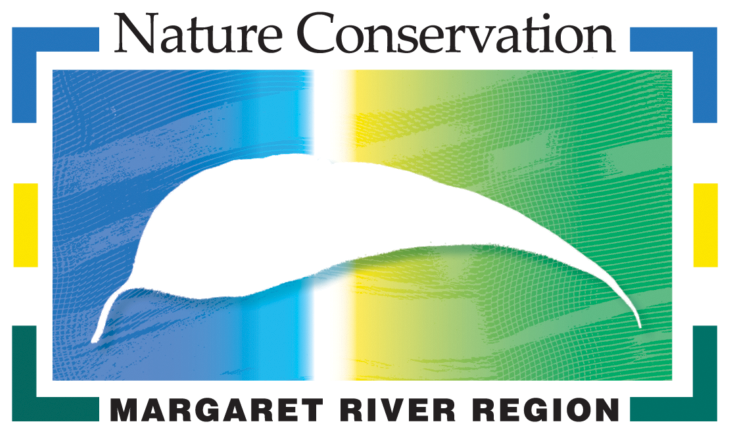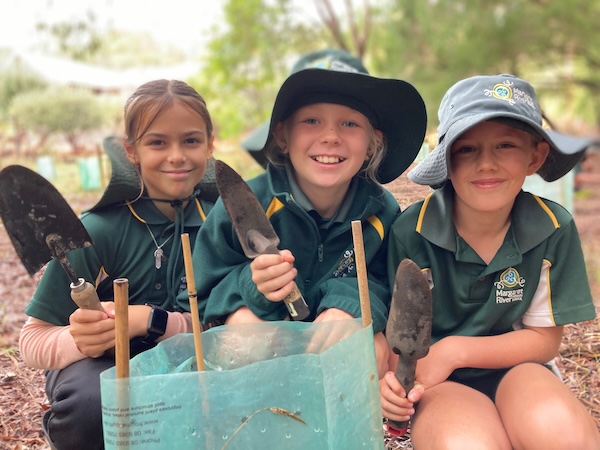These local students aren’t just planting natives to care for our environment – they’re also getting their hands dirty in the name of mental health and fighting a growing trend of “eco-anxiety”.
Nature Conservation Margaret River Region says, in a world where the environmental crisis, species and habitat loss, and climate change is dominating headlines more and more, there’s been a big rise in the number of people – particularly children – experiencing eco-anxiety as a result.
The conservation group is fighting back through its Adopt a Spot program, involving Year 4 students from nine schools across the Capes region. Each class learns about an area of bushland, river, foreshore or coastline, and throughout the year the students care for it by weeding, planting native seedlings, and watering, bagging and staking the plants. They are also learn from traditional owners and communicate the learning through art, but program coordinator Tracey Muir says the benefits go much deeper.
“These kids are doing great work for the environment but they’re also building resilience and bolstering their own mental health as well,” Adopt a Spot coordinator Tracey Muir said. “There is so much evidence now that just being in nature and connecting with your local ecosystem or getting your hands in the soil and doing volunteer work to improve it, is so beneficial to us. We are building personal and environmental resilience.”
Recently three classes from Margaret River Primary School got their hands dirty along the Margaret River by planting, staking and bagging native trees and shrubs, and removing weeds to give the seedlings the best chance of thriving. Teachers, parents and Nature Conservation staff also joined them to lend a hand.
“The kids, teachers, parents and volunteers in our Adopt a Spot program are all keen to roll up their sleeves, to make a difference and actively care for the landscapes we all love,” Ms Muir said. “Being connected to nature is so important for our wellbeing and to counteract all the doom and gloom. It’s a way to recharge and feel inspired, knowing we can make a positive difference. Feeling connected to place – and giving back to that place with a community of others – creates meaning and a sense of belonging.”
Last year, new figures laid bare the enormous impact of eco-anxiety on young Australians, with more than half fearful of their future because of the effects of climate change, according to the results of a survey by national youth mental health group Headspace.
That’s echoed by Nature Play WA, which says taking learning outside the classroom, into nature-specific settings, has measurable academic, socio-emotional and well-being benefits for children. That includes “increased student engagement and ownership of their learning, some evidence of academic improvement, development of social and collaborative skills, and improved self-concept factors”. Nature Play WA also says it’s essential for education policymakers to recognise that nature-specific learning outside the classroom is no longer a fringe, “nice-to have” approach to teaching and learning.
In the previous 12 months, Year 4 students in the Adopt a Spot program planted more than 2000 cuttings, almost 900 seedlings, and laid down 5 trailer-loads of brush to protect seedlings and dunes. Students are caring for sites in the Margaret River catchment as well as at Redgate, Hamelin Bay, Cowaramup Bay and Yallingup.
The program has been running for nine years but this year it is expanding thanks to a grant from the State of Western Australia and Department of Local Government, Sport and Cultural Industries. For the first time, the Year 4 students are also learning from traditional owners at their adopted sites. Professional artists will also collaborate with each school to help children explore and communicate the local plant, animal and Wadandi stories of connection through art.
Nature Conservation Margaret River Region general manager Drew McKenzie says environmental education is vital for inspiring the stewards of tomorrow and a key part of the not-for-profit group’s work. It includes the Adopt a Spot program, involving Year 4 students from nine schools, and the Our Patch program, involving Year 3 and Year 6 students from six schools in the Margaret River region.
Adopt a Spot is generously funded through the Shire of Augusta-Margaret River’s Environmental Management Fund, Line In The Sand philanthropic group, State of Western Australia and Department of Local Government, Sport and Cultural Industries.

